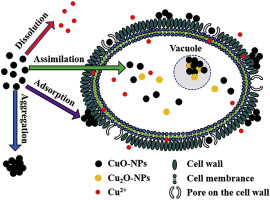当前位置:
X-MOL 学术
›
Chemosphere
›
论文详情
Our official English website, www.x-mol.net, welcomes your feedback! (Note: you will need to create a separate account there.)
Effect of Chlamydomonas reinhardtii on the fate of CuO nanoparticles in aquatic environment.
Chemosphere ( IF 8.8 ) Pub Date : 2020-01-17 , DOI: 10.1016/j.chemosphere.2020.125935 Erqin Yin 1 , Zhilin Zhao 2 , Zhongwen Chi 2 , Ziqi Zhang 2 , Ruixue Jiang 1 , Li Gao 3 , Jiashun Cao 4 , Xiaochen Li 2
Chemosphere ( IF 8.8 ) Pub Date : 2020-01-17 , DOI: 10.1016/j.chemosphere.2020.125935 Erqin Yin 1 , Zhilin Zhao 2 , Zhongwen Chi 2 , Ziqi Zhang 2 , Ruixue Jiang 1 , Li Gao 3 , Jiashun Cao 4 , Xiaochen Li 2
Affiliation

|
In this study, the effect of Chlamydomonas reinhardtii on the fate of CuO nanoparticles (CuO-NPs) in aquatic environment were investigated in terms of the colloidal stability, the free Cu2+ releasing, extracellular adsorption Cu (Cuex) and intracellular assimilation Cu (Cuin). The results showed that, with the increasing microalgal density, the absolute value of zeta potential of CuO-NPs decreased and the mean hydrodynamic diameter (MHD) became larger, leading to a better aggregation and settling behavior of CuO-NPs. The microalgae also promoted the free Cu2+ releasing, however, inhibited adsorption and assimilation of metal nanoparticles (MNPs) into microalgal cells, resulting in the reduction of the Cuex and Cuin per microalgal cell. The phenomenon was probably due to the reduced chance of contact between microalgae and MNPs. The internalization of CuO-NPs was also observed in microalgal cells by high resolution transmission electron microscope (HRTEM). Furthermore, the results of fast fourier transform (FFT)/inversed FFT (IFFT) analysis indicated that the CuO-NPs was reduced to Cu2O-NPs in the microalgae cells. The above results suggested that the microalgae can significantly affect the fate of MNPs, and subsequently, influencing the bioavailability and toxicity of MNPs in the aquatic environment.
中文翻译:

莱茵衣藻对水生环境中CuO纳米颗粒命运的影响。
在这项研究中,研究了莱茵衣藻对水生环境中CuO纳米颗粒(CuO-NPs)命运的影响,包括胶体稳定性,游离Cu2 +释放,细胞外吸附Cu(Cuex)和细胞内同化Cu(Cuin)。 。结果表明,随着微藻密度的增加,CuO-NPs的ζ电位绝对值减小,平均流体动力学直径(MHD)变大,从而导致CuO-NPs更好的聚集和沉降行为。微藻还促进了游离Cu2 +的释放,但是抑制了金属纳米颗粒(MNP)吸附和吸收到微藻细胞中,导致每个微藻细胞的Cuex和Cuin减少。该现象可能是由于微藻类与MNP之间接触的机会减少了。还通过高分辨率透射电子显微镜(HRTEM)在微藻细胞中观察到CuO-NP的内在化。此外,快速傅里叶变换(FFT)/逆FFT(IFFT)分析的结果表明,微藻细胞中的CuO-NPs被还原为Cu2O-NPs。以上结果表明,微藻可显着影响MNP的命运,进而影响水生环境中MNP的生物利用度和毒性。
更新日期:2020-01-17
中文翻译:

莱茵衣藻对水生环境中CuO纳米颗粒命运的影响。
在这项研究中,研究了莱茵衣藻对水生环境中CuO纳米颗粒(CuO-NPs)命运的影响,包括胶体稳定性,游离Cu2 +释放,细胞外吸附Cu(Cuex)和细胞内同化Cu(Cuin)。 。结果表明,随着微藻密度的增加,CuO-NPs的ζ电位绝对值减小,平均流体动力学直径(MHD)变大,从而导致CuO-NPs更好的聚集和沉降行为。微藻还促进了游离Cu2 +的释放,但是抑制了金属纳米颗粒(MNP)吸附和吸收到微藻细胞中,导致每个微藻细胞的Cuex和Cuin减少。该现象可能是由于微藻类与MNP之间接触的机会减少了。还通过高分辨率透射电子显微镜(HRTEM)在微藻细胞中观察到CuO-NP的内在化。此外,快速傅里叶变换(FFT)/逆FFT(IFFT)分析的结果表明,微藻细胞中的CuO-NPs被还原为Cu2O-NPs。以上结果表明,微藻可显着影响MNP的命运,进而影响水生环境中MNP的生物利用度和毒性。



























 京公网安备 11010802027423号
京公网安备 11010802027423号